Blog 6: A Blended Power Balance – Rethinking Power in the Therapy Room
At Connections Counselling, we’ve committed to seven core values, not as ideals to be spoken about once and shelved but as living principles that shape how we practice, relate, and show up. The third of these is A Blended Power Balance. It might not be a phrase you hear often in therapy spaces but it’s one we believe urgently needs to be named, explored, and embodied.

What Do We Mean by Power?
Power exists in every relationship. It isn’t inherently bad, in fact it can be a source of protection, trust and containment. It is often “taken” or “given” but it can also sit “neutrally”. In counselling, the traditional power dynamic tends to tip in one direction: the counsellor holds the knowledge, sets the rules and defines the boundaries. The client by contrast is positioned as needing help, often assumed to be less aware, less capable and less in control.
We want to disrupt that.
At Connections, we work to actively minimise these inherited imbalances. Instead of the counsellor as expert and client as recipient, we seek to co-create a space that is as mutually neutral as possible. One where both individuals bring value, presence and agency. This doesn’t mean a lack of structure or professionalism. It means that the how and why of our work is shaped by trust, not hierarchy.
As Counsellor, Also Client
One of the ways we honour this balance is through our own therapeutic engagement. All of our counsellors are either in or exploring a therapeutic relationship themselves or are in-between their previous and next. We believe that to fully understand the vulnerability, risk and courage it takes to be a client, we must sit in that seat ourselves. This isn’t a symbolic gesture, it’s a lived commitment. We are not above the work, we are in it too.
Because of that, we don’t pretend to have all the answers. We don’t give advice. We don’t claim expertise over someone’s lived experience. We are instead, guides, walking alongside clients, not leading them.

Contractual Agreement, Not Control
Yes, all our work is done under contract but not to impose control. Our contracts exist to support clarity and safety. Within that, the power sits with the client. They choose their counsellor. They choose how long they come for. They decide whether they want to return. It is their process, not ours. We are not gatekeepers. We are simply here when they are ready.
Challenging Industry Norms: Who Bears the Cost?
One area where we believe the profession must take a hard look at itself is in the financial structures surrounding missed or cancelled sessions.
It’s standard practice for clients to be charged if they miss a session or cancel within 24 hours. We understand the rationale: time has been reserved, and therapists need to protect their income. But here's where the power imbalance becomes problematic.
What happens when it’s the therapist who cancels last minute, forgets a session, or double books? Too often, there is no equivalent consequence, no recognition that the client’s time, needs or emotional preparation have been disrupted. This sends a troubling message, that the therapist’s time is more valuable, more protected, more important.
For clients who are already grappling with issues of self-worth, shame, or not feeling good enough, this simply reenforces the believes that they came to change.
It also risks signalling that therapy is only truly accessible to those who can afford financial penalties, reinforcing a model where wealth equates to worth. This disproportionately affects those from lower socioeconomic backgrounds, precisely the people who are most in need of sustained, compassionate and affirming support.
At Connections, we do not charge clients for missed or late-cancelled sessions. We trust that if someone doesn’t come, they had a reason. We also ask our counsellors to hold themselves to the same standard: to show up, to take responsibility when something goes wrong, and to never place themselves above the people they serve.

Power With, Not Over
Our aim is not to erase any difference, we recognise that we bring different roles, experiences, responsibilities and lives into the room. But we believe those differences can exist without domination. That mutual respect, honesty, and shared humanity can shape a new kind of therapeutic space, one that is with the client, not over them.
We call this a blended power balance. It’s not perfect. It’s not always easy. But it is something we work toward, every day, in every session.
Healing doesn’t happen when someone feels powerless. It happens when they feel met fully, equally and with care.

